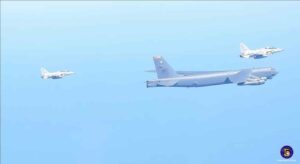
Philippines hits China, says joint air patrol with US to ensure free passage
THE PHILIPPINES on Wednesday hit China for criticizing its recent joint air patrol with the US, saying it was in line with its national interest and would ensure free navigation.
Three Philippine fighter jets and a US bomber aircraft on Monday flew over parts of the South China Sea within Manila’s exclusive economic zone, days after their navies held drills at sea.
“The joint air patrol or exercise conducted by the Philippine Air Force and the United States Pacific Air Force is a lawful and routine exercise aimed at enhancing interoperability between allied forces and promoting regional peace and security in the Indo-Pacific region,” the National Security Council (NSC) said in a statement.
China’s military has accused the Philippines of stirring up trouble in the South China Sea by conducting a joint air patrol with “extraterritorial countries” and then openly hyping it up.
China’s Southern Theater Command said it had organized front-line naval and air forces to monitor the Philippines’ joint air patrol. Troops “maintained a high degree of vigilance to resolutely defend national sovereignty,” it added.
NSC said its joint patrols with the US are held within Philippine territories, serving “the purpose of enhancing maritime security, promoting regional stability and upholding international law.” “These patrols help deter illegal activities, ensure freedom of navigation, and contribute to the protection of shared interests in the region.”
Monday’s air patrol covered areas 90 nautical miles (167 kilometers) west of Candon, Ilocos Sur and 50 nautical miles northwest of Lubang, Occidental Mindoro.
It was the air component of the third iteration of the Philippine military’s Maritime Cooperative Activity with the US Indo-Pacific Command.
“We urge China to respect the sovereign rights of the Philippines conducted within its territory, consistent with its national interests and international law,” NSC said.
The Philippines and China should adhere to established legal frameworks to keep their relations peaceful and stable, it added.
“Adherence to international norms is essential to the peaceful coexistence of neighboring states,” it said. “Respecting and following international law is essential for maintaining peace, resolving disputes and advancing our shared interests in the region.”
On Feb 9, the Philippine Navy’s BRP Gregorio del Pilar and the US Navy’s USS Gabrielle Giffords participated in the third iteration of the Maritime Cooperative Activity. Exercises included passing, communication and division tactics to enhance coordination between the two forces in maritime scenarios.
The Philippines under President Ferdinand R. Marcos, Jr. has sought closer ties with the US amid escalating tensions with China, which claims vast portions of the South China Sea.
“The joint air patrol with the US is part of our longstanding defense cooperation,” NSC said.
Philippine activists critical of China have also opposed the Southeast Asian nation’s growing security ties with the US, saying it makes the Philippines vulnerable to a potential war between the two rich nations.
Opposition to the Philippines’ security alliance with the US is nothing new, with senators rejecting the renewal of a military base agreement between the two countries in 1991.
The decision led to the dismantling of an American air base in Clark, Pampanga and a US naval base in Subic, Olongapo. The two sites, which are now economic hubs, are located north of Manila.
“We will continue to work closely with our friends, allies and partners to ensure a secure and prosperous future for all nations in the Indo-Pacific region,” NSC said.
Also on Wednesday, the Philippines Senate approved on second reading a bill that seeks to set up maritime zones and territories in the South China Sea.
Under Senate Bill 2492, or the proposed Philippine Maritime Zones Act, maritime zones will also be set up in the Benham Rise in the West Pacific.
Philippine authorities may impose a fine of as much as $1 million (P56 million) on foreign actors that build artificial islands, conduct marine research and destroy Philippine marine environments within the maritime zones.
Senator Francis N. Tolentino earlier said the Senate would craft a Philippine map to assert the country’s claim in the South China Sea in response to China’s so-called 10-dash line map.
The Philippines, Vietnam, India and Taiwan have criticized the map for covering regions beyond China’s borders and claiming most of the South China Sea. — Kyle Aristophere T. Atienza and John Victor D. Ordoñez



